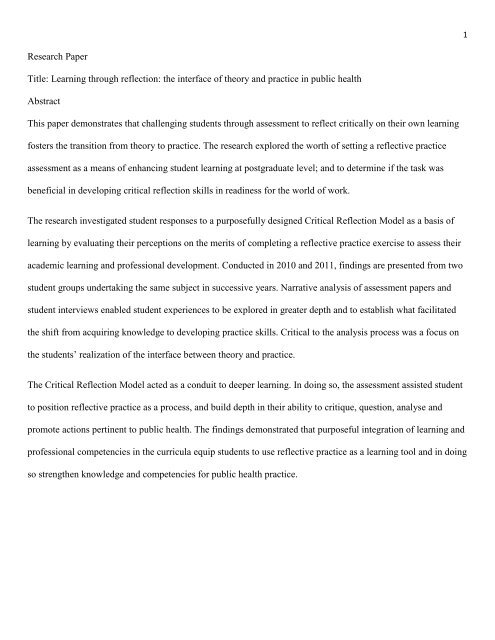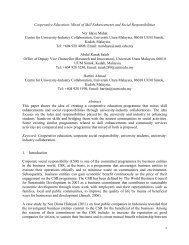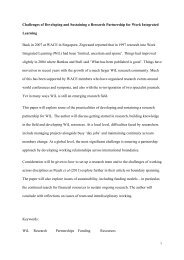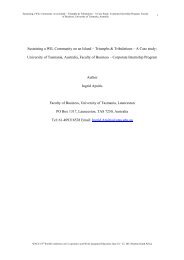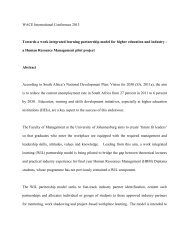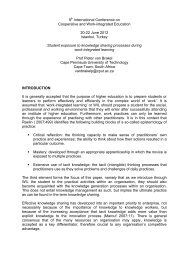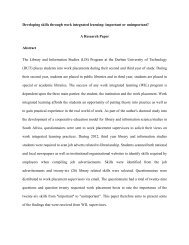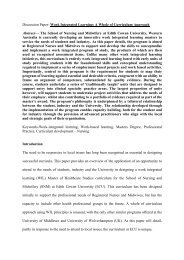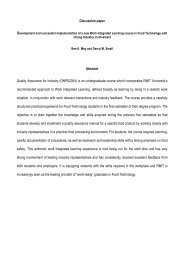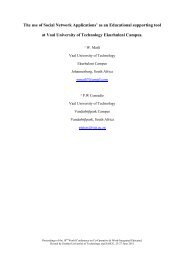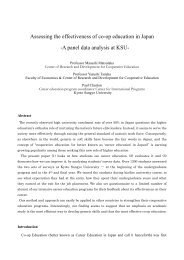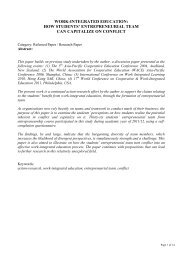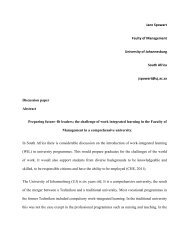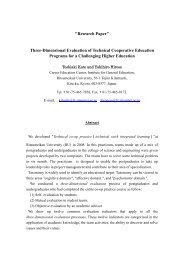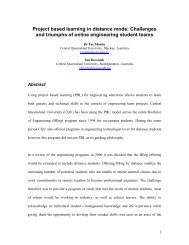Research Paper Title: Learning through reflection: the ... - WACE
Research Paper Title: Learning through reflection: the ... - WACE
Research Paper Title: Learning through reflection: the ... - WACE
You also want an ePaper? Increase the reach of your titles
YUMPU automatically turns print PDFs into web optimized ePapers that Google loves.
1<br />
<strong>Research</strong> <strong>Paper</strong><br />
<strong>Title</strong>: <strong>Learning</strong> <strong>through</strong> <strong>reflection</strong>: <strong>the</strong> interface of <strong>the</strong>ory and practice in public health<br />
Abstract<br />
This paper demonstrates that challenging students <strong>through</strong> assessment to reflect critically on <strong>the</strong>ir own learning<br />
fosters <strong>the</strong> transition from <strong>the</strong>ory to practice. The research explored <strong>the</strong> worth of setting a reflective practice<br />
assessment as a means of enhancing student learning at postgraduate level; and to determine if <strong>the</strong> task was<br />
beneficial in developing critical <strong>reflection</strong> skills in readiness for <strong>the</strong> world of work.<br />
The research investigated student responses to a purposefully designed Critical Reflection Model as a basis of<br />
learning by evaluating <strong>the</strong>ir perceptions on <strong>the</strong> merits of completing a reflective practice exercise to assess <strong>the</strong>ir<br />
academic learning and professional development. Conducted in 2010 and 2011, findings are presented from two<br />
student groups undertaking <strong>the</strong> same subject in successive years. Narrative analysis of assessment papers and<br />
student interviews enabled student experiences to be explored in greater depth and to establish what facilitated<br />
<strong>the</strong> shift from acquiring knowledge to developing practice skills. Critical to <strong>the</strong> analysis process was a focus on<br />
<strong>the</strong> students’ realization of <strong>the</strong> interface between <strong>the</strong>ory and practice.<br />
The Critical Reflection Model acted as a conduit to deeper learning. In doing so, <strong>the</strong> assessment assisted student<br />
to position reflective practice as a process, and build depth in <strong>the</strong>ir ability to critique, question, analyse and<br />
promote actions pertinent to public health. The findings demonstrated that purposeful integration of learning and<br />
professional competencies in <strong>the</strong> curricula equip students to use reflective practice as a learning tool and in doing<br />
so streng<strong>the</strong>n knowledge and competencies for public health practice.
2<br />
Introduction<br />
This paper discusses research undertaken in 2010 and 2011 which explored postgraduate student perceptions of<br />
structured reflective practice as a means of enhancing deeper learning and developing professional skills for<br />
practice in public health.<br />
Background<br />
Postgraduate studies at Deakin University, Australia, in public health and health promotion are course work<br />
programs designed to prepare graduates to be <strong>the</strong>oretically sound and confident in <strong>the</strong> practice of assessing<br />
public health situations and promoting population health. The courses offer a sound <strong>the</strong>ory base and integrate<br />
both public health (Australian Network of Academic Public Health Institutions [ANAPHI], 2009) and health<br />
promotion competencies (Australian Health promotion Association [AHPA], 2009) set down by peak bodies in<br />
<strong>the</strong> field. The postgraduate program attracts a large cohort of international students who have obtained<br />
undergraduate qualifications such as medicine and dentistry. At a domestic level, students come into <strong>the</strong> program<br />
with some background of social or medical health practice, for example, general practitioners, community nurses<br />
and social work, however, most have little formal qualification in public health (Moore, Miller & Heerde, 2009).<br />
Personal development and employability are critical to contemporary teaching and learning in higher education<br />
(Yorke, 2006; Smith et al., 2009). The literature highlights self-assessment of learning as key to personal<br />
development (Biggs & Tang, 2007), and that employers are continuing to place emphasis on attributes, skills,<br />
knowledge and attitudes when seeking tertiary qualified graduates (Smith et al., 2009). The principles of<br />
Personal Development Planning (PDP) encourage students to develop a stronger sense of professional<br />
development and personal career direction as <strong>the</strong>y engage in critical <strong>reflection</strong> and review learning in a<br />
developmental context (Edwards, 2005). A fur<strong>the</strong>r progression of PDP is Career Development <strong>Learning</strong> which<br />
supports students’ learning about <strong>the</strong>mselves and <strong>the</strong> world of work. Thus contemporary student learning<br />
expands beyond academic knowledge per se, to a broader context that involves learning as a process “… that<br />
represents <strong>the</strong> development of skills necessary to navigate a successful and satisfying life/career” (McMahon,
3<br />
Patton & Tatham, 2003 p.6). Kuisma (2007) suggests that health professionals need to be able to identify <strong>the</strong>ir<br />
own values, feelings and abilities so that <strong>the</strong>y can react appropriately to experiences when dealing with o<strong>the</strong>rs.<br />
Common to <strong>the</strong> literature regarding academic and professional development is <strong>the</strong> importance of reflective<br />
practice, where students’ <strong>reflection</strong>-in-action is pertinent in <strong>the</strong> transition of knowledge to practice (Smith et al.,<br />
2009; Biggs & Tang, 2007; Edwards, 2005). According to Moon (2006), students draw on external and internal<br />
experiences to inform learning. This relationship with <strong>the</strong> internal and external environment is important to<br />
recognize as a learner, in particular (Moon 2006, p.21) states that “… <strong>the</strong> prior experience (i.e. <strong>the</strong> state of <strong>the</strong><br />
cognitive structure) guides how we respond to a present experience”, and <strong>the</strong>refore, important to <strong>the</strong> learning<br />
process as <strong>reflection</strong> gives meaning to <strong>the</strong> information. In particular, reflective journaling encourages students to<br />
be in charge of <strong>the</strong>ir own learning, to reconstruct new knowledge in light of existing knowledge and experiences,<br />
and for students to assess <strong>the</strong>ir own development (Moon, 2006).<br />
In preparing students to be life-long learners, critical thinkers and analytical in <strong>the</strong>ir work; reflective practice<br />
provides a conduit for <strong>the</strong> development of such essential skills required for <strong>the</strong> promotion of population health<br />
(AHAP, 2009; ANAPHI, 2009).<br />
Integrating work with learning<br />
In <strong>the</strong> 2008 scoping study of WIL practices in Australian higher education, <strong>the</strong> report defined work integrated<br />
learning as “An umbrella term for a range of approaches and strategies that integrate <strong>the</strong>ory with <strong>the</strong> practice of<br />
work within a purposefully designed curriculum” (Patrick et al., 2008, p.iv). Placed in this paradigm <strong>the</strong><br />
integration of work in higher education becomes more complex than students merely undertaking a number of<br />
hours of fieldwork experience. Integration of <strong>the</strong>ory and practice in a contemporary sense is structured around<br />
providing student learning opportunities that focus on increasing an individual’s level of employability (Yorke,<br />
2006). With dynamic changes in <strong>the</strong> contemporary workplace, <strong>the</strong> skills employers are seeking from higher<br />
education graduates are also changing leaving <strong>the</strong> university sector under greater pressure to integrate workbased<br />
practices in student courses as a means of enhancing graduate employability (Bates, 2008). Deakin
4<br />
University’s Functional Area Plan Teaching and <strong>Learning</strong> 2008 outlines strategies and actions for teaching<br />
programs which develop graduates to connect with <strong>the</strong> workplace (Deakin University 2008). However, such<br />
plans require commitment and resources from academics and faculties to adopt teaching approaches that provide<br />
work-oriented student learning opportunities by way of assessment, classroom activities as well as field<br />
experience. Therefore, it is critical that course structures are assessed to ascertain how well individual units<br />
provide WIL opportunities in <strong>the</strong> classroom. Given, <strong>the</strong> literature supports <strong>the</strong> notion of teaching and learning<br />
practice designed to link academic development with <strong>the</strong> world of work (Biggs & Tang, 2007), this research<br />
demonstrates <strong>the</strong> integration of health promoting competencies in <strong>the</strong> postgraduate curriculum. The focus and<br />
application of critical <strong>reflection</strong> is a stepping stone toward developing an enhanced appreciation by students of<br />
self-initiated learning to promote knowledge, skills, attributes and <strong>the</strong> interface between <strong>the</strong>ory and public health<br />
practice.<br />
A social view of health<br />
The paper identifies <strong>the</strong> intersection of <strong>the</strong>ory and practice in public health, and <strong>the</strong>refore acknowledges that <strong>the</strong><br />
delivery of postgraduate education in public health involves <strong>the</strong> promotion of health at a population level. Thus,<br />
this paper is underpinned by <strong>the</strong> notion that health encompasses <strong>the</strong> social, economic and environmental factors<br />
that contribute to health outcomes for <strong>the</strong> better or worse (Reidpath, 2004). Reference to public health <strong>the</strong>refore,<br />
considers health from a public lens and encompasses health promotion practice.<br />
<strong>Research</strong> aims<br />
The aim of this research was to investigate <strong>the</strong> worth of setting a reflective practice assessment as a means of<br />
enhancing student learning at postgraduate level, and to determine if <strong>the</strong> task was beneficial in develop critical<br />
<strong>reflection</strong> skills in readiness for <strong>the</strong> world of work. A key objective of <strong>the</strong> research was to explore <strong>the</strong> interface<br />
of <strong>the</strong>ory with practice, and develop an understanding of when and how reflective practice assisted students to<br />
come to link real life examples to <strong>the</strong> <strong>the</strong>oretical underpinning of public health. This connecting of <strong>the</strong>ory and<br />
practice was colloquially termed in <strong>the</strong> unit, and <strong>through</strong>out <strong>the</strong> research, as an ‘Ah-Ha’ moment.
5<br />
Methodology<br />
Study design<br />
The research considered <strong>the</strong> application of a Critical Reflection Model for student assessment, and an evaluation<br />
of student perceptions about <strong>the</strong> merits of reflective practice to assist academic learning and professional skills.<br />
<strong>Research</strong> context<br />
This research was undertaken in 2010, and repeated with a successive student cohort in 2011. The reflective<br />
practice assessment formed twenty percent of <strong>the</strong> overall assessment for <strong>the</strong> Contemporary Health Issues and<br />
Policies subject, a core unit in <strong>the</strong> postgraduate courses of public health, health promotion and health and human<br />
services management. The Critical Reflection Model was created to assist students to make a link between<br />
academic learning and professional practice. Employed as a learning resource to prompt <strong>reflection</strong>, <strong>the</strong> model<br />
was designed to develop critical <strong>reflection</strong> skills so that students would interrogate how what <strong>the</strong>y learned in <strong>the</strong><br />
class environment developed professional skills. Hence, <strong>the</strong> intent of <strong>the</strong> model was to develop deeper levels of<br />
learning and professional acknowledgment.<br />
The following Critical Reflection Model developed by <strong>the</strong> researcher asked students to reflect and comment on<br />
five reference points:<br />
1: Why <strong>the</strong>y had enrolled in <strong>the</strong> particular postgraduate course <strong>the</strong>y were undertaking?<br />
2: What <strong>the</strong>ir learning goals were specifically for <strong>the</strong> unit of study?<br />
3: What knowledge of contemporary health and/or policy did <strong>the</strong>y bring to <strong>the</strong> unit?<br />
4: How do <strong>the</strong>y learn? What learning styles assisted <strong>the</strong>m to gain knowledge and skills?<br />
5: What skills do <strong>the</strong>y have at this point of <strong>the</strong>ir professional and academic career?<br />
The assessment task asked students to respond to <strong>the</strong> model in weeks two and ten of <strong>the</strong> unit. They were required<br />
to undertake reflective practice (as journal notes) across <strong>the</strong> trimester, drawing on facets of <strong>the</strong> unit including<br />
materials provided by <strong>the</strong> unit chair. A summary paper of <strong>the</strong>ir journal notes of contemporary health and policy<br />
formed <strong>the</strong> main component of <strong>the</strong> assessment. Additional to <strong>the</strong> summary paper, <strong>the</strong> students had to identify
6<br />
three ‘Ah-Ha’ moments that provided clear examples of how and when <strong>the</strong>y contextualized <strong>the</strong> interface of<br />
<strong>the</strong>ory and practice.<br />
Students were supported in <strong>the</strong> assessment <strong>through</strong> additional resources and activities that gave guidance on<br />
developing reflective practice skills. For example, weekly reflective prompts (called independent learning<br />
activities); reading materials that explained how to practice critical <strong>reflection</strong>, and an assessment task briefing<br />
paper that provided a rationale of why <strong>the</strong>y were undertaking <strong>the</strong> exercise were used. Students were also<br />
provided with a rubric marking guide on <strong>the</strong> associated levels of <strong>reflection</strong> required for postgraduate study and<br />
for this assessment.<br />
Data ga<strong>the</strong>ring and process<br />
The study focused on a narrative inquiry and analysis to explore students’ perceptions. Narrative analysis is<br />
considered an effective method with which to make sense of <strong>the</strong> story told (Daly, 2007). For <strong>the</strong> purpose of this<br />
study, narrative analysis was appropriate as it enabled experiences of <strong>the</strong> assessment task to be explored in<br />
greater depth. An important characteristic of narrative inquiry is how <strong>the</strong> story is constructed to illustrate “…<br />
different points of time and to move between <strong>the</strong> past, present and future …” (Daly, 2007, p.112). This notion of<br />
time was critical to <strong>the</strong> reflective practice exercise as it provided insight on how students assessed <strong>the</strong>ir own<br />
transition in learning and professional development across <strong>the</strong> study period.<br />
The students’ completed assessment tasks formed <strong>the</strong> primary data set, with a number of interview transcripts<br />
providing in-depth assessment of <strong>the</strong> worth of a reflective practice assessment for students in public health.<br />
Recruitment for <strong>the</strong> study was independently undertaken by <strong>the</strong> project’s research fellow. Forty-five students<br />
provided completed assessment tasks with twenty-four students participating in semi-structured interviews.<br />
Thematic analysis of <strong>the</strong> narratives was conducted by <strong>the</strong> researcher.<br />
Ethics<br />
Ethics approval to conduct <strong>the</strong> research was granted by Deakin University Human <strong>Research</strong> Ethics Committee in<br />
2010 and 2011.
7<br />
Limitations<br />
The Critical Reflection Model was developed in response to student feedback suggesting that <strong>the</strong> unit lacked<br />
links to <strong>the</strong> real world of work. Newly appointed to <strong>the</strong> unit, <strong>the</strong> researcher designed <strong>the</strong> assessment to include a<br />
diagrammatic way in which students could construct, develop and assess <strong>the</strong>ir own academic and professional<br />
development. Thus, <strong>the</strong> experimental nature of <strong>the</strong> model and assessment was developed in readiness for <strong>the</strong><br />
2010 academic year without little thought of how to evaluate <strong>the</strong> impact of such a different assessment task and<br />
learning process. The positive response to <strong>the</strong> task by students’ mid-way <strong>through</strong> <strong>the</strong> study period highlighted<br />
<strong>the</strong> need for a study to capture student perceptions and developmental outcomes. The combination of developing<br />
a research action project, <strong>the</strong> newness of <strong>the</strong> idea to <strong>the</strong> researcher and limitations in accessing students may<br />
have limited <strong>the</strong> study. However, given that <strong>the</strong> study was repeated in 2011with similar outcomes, <strong>the</strong> findings<br />
have identified that such assessment is important in developing students academically and professionally.<br />
Results and discussion<br />
The points listed below illustrate how students at an individual and shared level perceived that <strong>the</strong>y benefited<br />
from undertaking <strong>the</strong> assessment task:<br />
<br />
<br />
<br />
<br />
<br />
An increased interest and appreciation of what <strong>the</strong>y were learning, and why<br />
A greater level of learning when skills were identified and developed incrementally<br />
More confidence to question and debate, particularly by international students<br />
A greater appreciation of <strong>the</strong>ir own learning and <strong>the</strong> responsibility that came with this<br />
Recognition of <strong>the</strong> need for reflective practice and <strong>the</strong> assessment task to be well supported by resources<br />
that equip students to think more critically<br />
<br />
<br />
Recognition of <strong>the</strong> value of ‘Ah-Ha’ moments to enhance deeper learning<br />
Acknowledgement of <strong>the</strong> personal lessons that came from goal setting, reflective practice and in<br />
particular asking questions of <strong>the</strong>mselves
8<br />
In <strong>the</strong> discussion which follows, <strong>the</strong> findings have been grouped under three broad headings representing <strong>the</strong><br />
critical lessons to emerge from this study. They are discussed within <strong>the</strong> context of <strong>the</strong> existing literature:<br />
1. The worth of embedding a critical <strong>reflection</strong> assessment task to enhance student learning<br />
2. The facilitators that assisted <strong>the</strong> shift from information to application<br />
3. The interface of understanding, <strong>the</strong> ‘Ah-Ha’ moments that demonstrate learning<br />
The worth of embedding critical <strong>reflection</strong> in postgraduate study<br />
Undertaking this study has demonstrated <strong>the</strong> benefits of developing teaching approaches that provoke and<br />
develop critical thinking, in this case in a systematic approach that empowers and develops students’ skills.<br />
Importantly, <strong>the</strong> investment in <strong>reflection</strong> time and associated supporting resources enhanced student learning and<br />
applicability to practice. The following examples illustrate <strong>the</strong> importance of such an exercise in enhancing<br />
personal and professional development. In particular, <strong>the</strong> student comments highlight <strong>the</strong> changes that transpired<br />
as <strong>the</strong>y were empowered to recognize <strong>the</strong>ir own responsibility in learning and in doing so; shift <strong>the</strong> purpose and<br />
focus of study from a degree as <strong>the</strong> end product to a greater appreciation of <strong>the</strong> learning taking place.<br />
In my case, I can say that <strong>through</strong> journal writing after each week’s lecture my learning was enhanced and I gained a<br />
greater understanding of concepts that were explored…It also helped me to relate <strong>the</strong> course <strong>the</strong>ory to events or topics<br />
encountered in my everyday life which also enhanced my learning (# 1).<br />
Through reflective journaling I was able to identify characteristics and factors that have acted as barriers to my learning<br />
and development. [Being] outcome oriented in my approach to work and studies, [I was] losing sight of <strong>the</strong> steps required<br />
in <strong>the</strong> interim to achieve this … I tended to tick off my ‘to do list’ ra<strong>the</strong>r than giving attention to <strong>the</strong> quality in which I had<br />
completed tasks … This, I now understand is a significant barrier for my learning and for developing my skills. For this<br />
reason <strong>the</strong> very act of reflective learning has awoken me to a way to develop personally and professionally (# 4).<br />
Importantly, <strong>the</strong> worth of <strong>the</strong> exercise extended to students already working in <strong>the</strong> public health field. For those<br />
students, being able to develop a process of <strong>reflection</strong>, to journal and to question helped construct ways forward<br />
for practitioners.
9<br />
It has been a complimentary process – academic and in practice. I reflected on <strong>the</strong> re-structuring of my organization ...<br />
Reflective practice has reinforced a need to rethink how to better approach leadership and mentor roles. I have taken a lot<br />
from this process. The reflective practice assessment has increased my identification of process as it draws on <strong>the</strong> why<br />
questions ra<strong>the</strong>r than what questions (#24).<br />
The facilitators that assisted <strong>the</strong> shift from information to application<br />
The Critical Reflection Model acted as a conduit to assist students increase <strong>the</strong>ir curiosity and begin to question<br />
aspects of <strong>the</strong>ir own learning that <strong>the</strong>y had not considered previously.<br />
Undertaking <strong>the</strong> model made me sit back and think about my skill sets and develop ways to improve <strong>the</strong>se (#25).<br />
The reflective practice required me to stop and really evaluate not only my unit goals but more broadly my course and<br />
career goals. By embracing <strong>the</strong> unit as an opportunity to clarify my course goals, ra<strong>the</strong>r than ano<strong>the</strong>r requirement to be<br />
‘ticked-off’, I have begun thinking about <strong>the</strong> next steps of transition into my aspired career path. … I have not only gained<br />
knowledge, but I have been encouraged [to] initiate working relationships which will hopefully progress in <strong>the</strong> future (#4).<br />
The assessment task was embraced by <strong>the</strong> students, as it tended to help establish awareness of <strong>the</strong>ir own role in<br />
learning and <strong>the</strong> responsibility that independent, critical, reflective learning brings. The task provided space and<br />
time to think about what <strong>the</strong>y had discovered and reinforced professional directions, confidence and personal<br />
ambitions. Students stated that it made <strong>the</strong>m more active learners, more reflective practitioners; <strong>the</strong>y increased<br />
<strong>the</strong>ir understanding of <strong>the</strong> principles of critical <strong>reflection</strong> and <strong>the</strong> need for such <strong>reflection</strong> at postgraduate level.<br />
Similarly, reflective learning drew <strong>the</strong> unit content toge<strong>the</strong>r and connected <strong>the</strong>ory to practice more easily for<br />
those students working in <strong>the</strong> health sector. Hence <strong>the</strong> model, supported by learning resources encouraged<br />
students to be curious, to question, and to critique, and to be active ra<strong>the</strong>r than passive learners.<br />
I now have a strong sense of <strong>the</strong> importance of <strong>reflection</strong> in professional practice and <strong>the</strong> need to commit to <strong>the</strong> process of<br />
lifelong learning (# 6).<br />
The process of reflective practice has given me an opportunity to engage with <strong>the</strong> content of <strong>the</strong> unit in a very different, yet<br />
valuable way. It has prompted a deeper level of thought and encouraged me to fur<strong>the</strong>r develop my critical analysis skills. I<br />
look forward to applying reflective practice principles to my future study and professional work (#1).
10<br />
What has changed - I have had a veil lifted on how to look at what I do in a different light. I can see large improvements<br />
already in my clinical teaching. This exercise via <strong>the</strong> course has been invaluable. … Ego and arrogance has taken a fall<br />
and enthusiasm to improve my teaching ability has risen in its place (#4).<br />
Reflective practice can be used to develop new perspectives on issues and assist in <strong>the</strong> application of <strong>the</strong>ory to<br />
practice (Hatlevik, 2011). Documenting <strong>reflection</strong>s in a journal (as required by students in this task) is known to<br />
encourage students to take charge of <strong>the</strong>ir own learning, to construct new knowledge in light of <strong>the</strong>ir existing<br />
knowledge and experience and to assess <strong>the</strong>ir own development (Moon, 2006). The assessment task assisted<br />
students to be reflective learners, as well as equip <strong>the</strong>m in a critical competency area of public health practice.<br />
The encouragement of being mindful about reflective practice in this unit has been an enlightening experience that has<br />
contributed to many intended and unintended learning outcomes (#11).<br />
Reflection in this subject has allowed me to understand <strong>the</strong> key learnings involved in contemporary health issues and<br />
policies. In particular, I am now able to see <strong>the</strong> relevance of social determinants and policy in my life (# 22).<br />
A purposeful undertaking of <strong>the</strong> unit was to support students to develop <strong>the</strong> art of critical <strong>reflection</strong> and in doing<br />
so, facilitate learning to application. Equipping students to reflect <strong>through</strong> a number of supporting resources was<br />
stated by students as pertinent to <strong>the</strong>ir overall building of knowledge and skills across <strong>the</strong> unit.<br />
The reflective exercises [independent learning activities] helped to put <strong>the</strong> information gained into perspective. To learn<br />
about policy is one thing, but to use every day examples like gambling to explain <strong>the</strong> different types of policy enabled me to<br />
gain a deeper understanding (# 17).<br />
Similarly, <strong>the</strong> interviews highlighted <strong>the</strong> importance of implementing strategies to support student learning.<br />
Resources to assist students on how to reflect, and build on existing experiences were considered important to<br />
<strong>the</strong> learning process. Teaching practices that use materials and activities aligned to assessment and intended<br />
learning outcomes are more likely to enhance learning (Biggs & Tang, 2007). Providing dedicated study blocks<br />
to assist students align <strong>the</strong>ory with practical application was considered important to <strong>the</strong>ir learning. As <strong>the</strong><br />
student experience below suggests, not all units provide space and opportunity to build knowledge and develop a<br />
clear understanding of what is important and relevant to learn.
11<br />
The study blocks with <strong>the</strong> independent week for <strong>reflection</strong> gave me space; it gave me time to learn. In this unit I was<br />
standing on stones very clearly seeing goals, not drowning on concrete steps (# 28).<br />
Such actions to include differing teaching approaches such as reflective, independent study periods are supported<br />
by Mezirow (1997), who suggests that adult learners need to be more autonomous thinkers, and thus,<br />
interventions that facilitate deeper learning are necessary for <strong>the</strong> leaner to develop meaningful knowledge.<br />
‘Ah-Ha’ moments - The interface of <strong>the</strong>ory with practice<br />
The lived experience of translating <strong>the</strong>ory to practice was keenly embraced by <strong>the</strong> students as critical to <strong>the</strong>ir<br />
learning. The Ah-Ha moments, initially considered light-hearted in <strong>the</strong> overall assessment task, were<br />
subsequently recognized by students as critically important. Once students had experienced circumstances where<br />
<strong>the</strong>y understood concepts and <strong>the</strong>ory at a practical level and could identify how that changed happened, such<br />
‘Ah-Ha’ moments were seen as an extremely powerful component of <strong>the</strong> assessment task. For example, <strong>the</strong><br />
student below who had grappled with how to apply social health in a medical context was struck by <strong>the</strong><br />
messages he took away from an audio-link provided to students as a reflective practice activity.<br />
The interview with Sir Michael Marmot on <strong>the</strong> Health Report was a significant experience for me during this unit … His<br />
belief that <strong>the</strong> general practitioner can achieve a great deal during 1:1 consultations with <strong>the</strong>ir patients was encouraging<br />
for me and an endorsement of a process I questioned as a course goal. He endorses <strong>the</strong> GP role in relation to universal<br />
healthcare access, health promotion and prevention oriented consultations. My role as a patient advocate as well as<br />
working in partnership with o<strong>the</strong>r health workers is one way to influence <strong>the</strong> social determinants of health (#3).<br />
Similarly, a community health practitioner suggested an early reading increased <strong>the</strong>ir awareness of <strong>the</strong><br />
many social factors impacting on health, an area in which <strong>the</strong>y not given broader attention to before.<br />
Whilst my understanding of SDOH was solid, I really only considered <strong>the</strong> Marmot and Wilkinson (2003) list of <strong>the</strong> ten<br />
SDOH as <strong>the</strong> Holy Grail. It was <strong>the</strong>refore inspiring and my first ah-ha moment of <strong>the</strong> subject when I read Keleher and<br />
MacDougal (2009), when <strong>the</strong> authors considered o<strong>the</strong>r SDOH that had not even crossed my mind., including climate<br />
change and human rights (#12).<br />
‘Ah-Ha’ moments also highlighted how <strong>the</strong>ory can get lost in practice and <strong>the</strong> importance of <strong>reflection</strong> to reinforce<br />
<strong>the</strong> principles and practice of public health.
12<br />
Although <strong>the</strong> social determinants were a familiar concept, so often within a health promotion management role I am<br />
engrossed in <strong>the</strong> day-to-day administration of projects and programs … that it is easy to become lax about health<br />
promotion <strong>the</strong>ory. I found it extremely helpful to get back to basics, and have <strong>the</strong> opportunity for <strong>reflection</strong> on <strong>the</strong><br />
presence or lack <strong>the</strong>reof health promotion <strong>the</strong>ory in my current role (# 9).<br />
Important to <strong>the</strong> exercise was <strong>the</strong> discovery of learning. The following two examples provide insight to student<br />
learning in action.<br />
I’ve always used journals in my personal life- but never for study or work. Since my HSH702 journal has been so useful<br />
I’ve started using a journal for work. Articulating my thoughts, structuring <strong>the</strong>m, and objectively assessing <strong>the</strong>m have<br />
really helped me to create lasting learning’s and positive action. Journaling itself has created my ‘ah-ha’ moment (# 20).<br />
The first ah-ha moment was when I completed assignment one on <strong>the</strong> SDOH, I felt it was wrong of me to assume initially<br />
that I possessed excellent knowledge on <strong>the</strong> subject. The amount I learned from <strong>the</strong> unit made me realize <strong>the</strong>re was<br />
something more to learn (#21).<br />
Not only did <strong>the</strong> ‘Ah-Ha’ moments bring <strong>the</strong>ory to life, but also <strong>the</strong> opportunity to debrief and share experiences<br />
initiating fur<strong>the</strong>r learning opportunities. Students gained much from <strong>the</strong>se informal debriefing sessions.<br />
The debrief was really helpful … you heard a variety of experiences, backgrounds and great learnings… I found this<br />
session very interesting and new to my previous learning environment. It was informative and opened my eyes on what<br />
o<strong>the</strong>r people take away from a learning experience (#37).<br />
Conclusions<br />
This research explored <strong>the</strong> merits of a reflective practice assessment as a means of enhancing student learning at<br />
postgraduate level. The critical <strong>reflection</strong> exercise assisted both international and domestic students to better<br />
understand <strong>the</strong> values of lifelong learning and to develop academic skills that promote greater critique,<br />
deconstruction and assessment of evidence to develop knowledge. Consequently, undertaking reflective practice<br />
provided an opportunity for students to link knowledge and employability features expected of postgraduate<br />
students to professional practice and personal career ambitions. The two studies over 2010 and 2011 demonstrate<br />
a need for consideration to be given to <strong>the</strong> merits of including professional skill development in curriculum<br />
assessment, particularly at postgraduate level.
13<br />
References<br />
Australian Health Promotion Association. (2009). Health Promotion Competencies. Retrieved from<br />
http://www.healthpromotion.org.au/images/stories/pdf/core%20competencies%20for%20hp%20practitioners.pdf<br />
Australian Network of Academic Public Health Institutions (2009).<br />
Foundation competencies for master of public health graduates in Australia.<br />
Retrieved from http://www/phaa.net.au/documents/ANAPHI_MPH%20competencies.pdf<br />
Bates, M. (2008). Work-integrated curricula in university programs. Higher Education <strong>Research</strong><br />
& Development, 27(4), 305-317.<br />
Biggs, J., & Tang, C. (2007). Teaching for quality learning at university, 3 rd edition,<br />
Maidenhead: Open University Press.<br />
Daly, K. (2007). Qualitative methods for family studies and human development.<br />
Thousand Oaks: Sage Publications.<br />
Deakin University. (2008). Deakin University functional area plan: teaching and learning 2008.<br />
Deakin University: Geelong.<br />
Edwards, G. (2005). Connecting PDP to employer needs and <strong>the</strong> world of work, The Higher<br />
Education Academy. Retrieved from http://www.heacademy.ac.uk/
14<br />
Hatlevik, I. (2012). The <strong>the</strong>ory-practice relationship: reflective skills and <strong>the</strong>oretical knowledge as key factors in<br />
bridging <strong>the</strong> gap between <strong>the</strong>ory and practice in initial nursing education. Journal of Advanced Nursing 68(4),<br />
868-877.<br />
Kuisma, R. (2007). Portfolio assessment of an undergraduate group project. Assessment and<br />
Evaluation in Higher Education, 32(5), 557-569.<br />
McMahon, M., Patton, W., & Tatham, P. (2003). Managing life learning and work in <strong>the</strong> 21 st<br />
Century. Subiaco: Miles Morgan.<br />
Mezirow, J. (1997). Transforming <strong>Learning</strong>: <strong>the</strong>ory to practice, New Directions for Adult<br />
Continuing Education, 7, 5-12.<br />
Miller, E., Moore, J. & Heerde, J. (2009). Public Health and Health Promotion Postgraduate<br />
Course Review 2009, School of Health and Social Development, Deakin University.,<br />
Patrick, C-J., Peach, D., Pocknee, C., Webb, F., Fletcher, M., & Pretto, G. (2008).<br />
The WIL [Work Integrated <strong>Learning</strong>] Report: A national scoping study [Australian <strong>Learning</strong> and<br />
Teaching Council (ALTC) Final report]. Retrieved from<br />
http://www.acen.edu.au/images/project/wil_report_web_22jan09.pdf<br />
Reidpath, D. (2004), Social determinants of health. In H. Keleher & B. Murphy, (Eds),<br />
Understanding health: A determinants approach (9-22). Oxford University Press: Melbourne.
15<br />
Smith, M., Brooks, S., Lichtenberg, A., McIlveen, P., Torjul, P. & Tyler, J. (2009).<br />
Career Development learning: maximising <strong>the</strong> contribution of work-integrated learning to <strong>the</strong> student<br />
experience, Final Project Report June 2009.<br />
Retrieved from http://www.Smith et. al. .org.au/uploads/file/ALTC%20Report%20July.pdf<br />
Yorke, M. (2006). Employability in higher education: what it is – what it is not?<br />
Retrieved from<br />
http://www.heacademy.ac.uk/assets/York/documents/ourwork/tla/employability/id116_employability_in_<br />
higher_education_336.pdf


